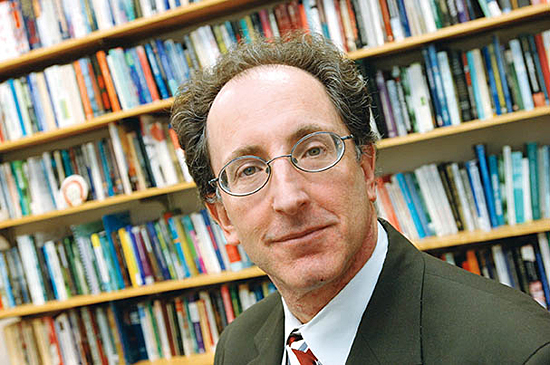

Faculty
The Study of Special Interests
Recognized for his innovative approach to the study of special interests, Lawrence Rothenberg is the first Corrigan-Minehan Professor of Political Science.
By Kathleen McGarvey
In an election year, the efforts of interest groups can come under wide scrutiny.
But for political scientist Lawrence Rothenberg, the functions and effects of interest groups are a source of constant interest. And his approach to their study is unique in his field.
Rather than examining interest groups in isolation, Rothenberg—who is also an expert in environmental politics—integrates the study of interest groups, bureaucracy, and regulation.
“Typically, students of interest groups focus on the inner workings of these groups or the interplay between them and the agencies with which they interact,” says Gerald Gamm, chair of the Department of Political Science. “But Larry goes much further, showing how decisions by presidents affect negotiations between interest groups and agencies, how courts matter to the process, and how policy is both a consequence and a cause of the mobilization of members in these groups.”

PROFESSORSHIP: The newly appointed Corrigan-Minehan Professor of Political Science, Lawrence Rothenberg studies the political influence of interest groups.
In recognition of Rothenberg’s imaginative scholarship and significant contributions to his field, the University has named him the Corrigan-Minehan Professor of Political Science in the College of Arts, Sciences & Engineering. Endowed through a gift from E. Gerald Corrigan, and his wife, Cathy Minehan ’68, University trustee, the professorship supports a scholar who epitomizes the research and teaching excellence of the late political scientist William F. Riker.
Rothenberg originally joined the University in 1989 and is the former director of the W. Allen Wallis Institute of Political Economy at the University. From 2002 to 2005, he taught at the Kellogg School of Management at Northwestern University, where he was director of the Ford Center on Global Citizenship. Rothenberg returned to Rochester in 2005.
“I knew Bill Riker for the last five years or so of his life and, in many ways, through his devoted students and colleagues,” Rothenberg says. “His ability to lead, to be a great teacher and mentor to undergraduates and graduates alike, and to be a fabulous scholar—all at the same time—is only an aspiration for most of us.”
Riker, whose example inspired the professorship, revolutionized the modern study of political science after he joined the University in 1962. He helped create the field of positive political theory and demonstrated the value of rigorous scientific theory for understanding empirical regularities in politics. With his colleagues and their students, Riker established the University’s Department of Political Science as one of the nation’s leading centers of political science.
Rothenberg is the author of Environmental Choices: Policy Responses to Green Demands (CQ, 2002), Why Governments Succeed and Why They Fail (Harvard University Press, 2001; with Amihai Glazer), Regulation, Organizations, and Politics: Motor Freight Policy at the Interstate Commerce Commission (University of Michigan Press, 1994), and Linking Citizens to Government: Interest Group Politics at Common Cause (Cambridge, 1992).
His research interests feed his teaching, with courses on interest groups, bureaucratic politics, and environmental affairs.
